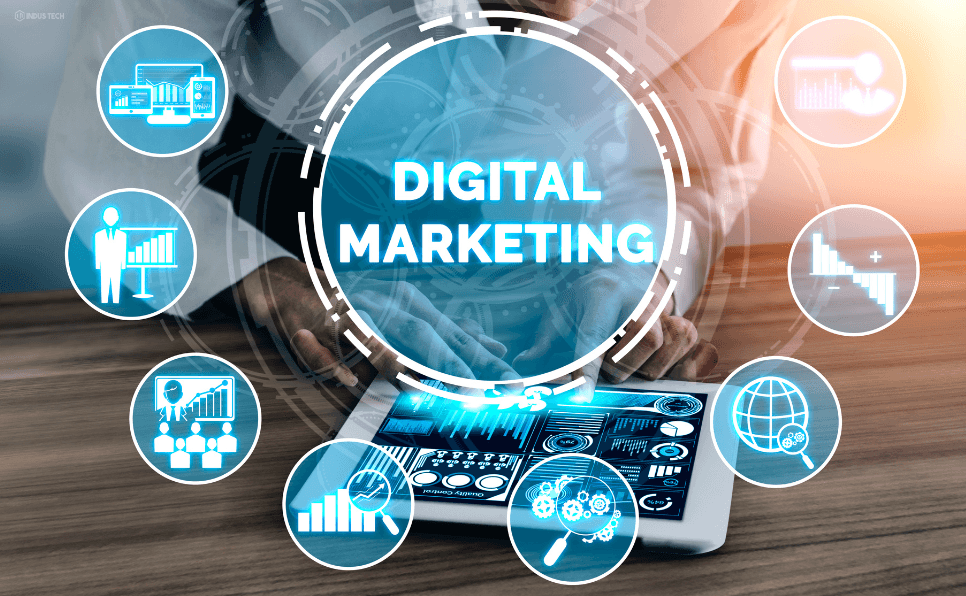This comprehensive guide provides a step-by-step approach to digital marketing, covering key areas like SEO, content marketing, social media, and paid advertising. Learn how to create a winning strategy and achieve measurable results.
Digital Marketing: The Ultimate Guide to Growing Your Online Presence .
Digital marketing has transformed the way businesses reach and engage with their audience. In today’s digital era, having a strong online presence is essential for brand visibility, customer acquisition, and revenue growth. This guide explores the fundamentals, strategies, and future trends of digital marketing to help you stay ahead of the competition.
Understanding Digital Marketing
What is Digital Marketing?
Digital marketing encompasses all online strategies used to promote products or services. It leverages digital channels such as search engines, social media, email, and websites to connect with potential customers.
Traditional vs. Digital Marketing
Unlike traditional marketing (TV, radio, print), digital marketing provides measurable results, targeted advertising, and interactive engagement. It allows businesses to reach a global audience at a lower cost.
Evolution of Digital Marketing
From basic websites in the early 2000s to AI-driven marketing strategies today, digital marketing has evolved rapidly. Social media, mobile marketing, and automation have changed how brands interact with consumers.
Core Components of Digital Marketing
Search Engine Optimization (SEO)
Enhances website visibility on search engines like Google.
On-page SEO: Optimizing content, meta tags, and keywords.
Off-page SEO: Building backlinks and domain authority.
Best practices: High-quality content, fast website speed, and mobile-friendliness.
Content Marketing
Content is king in digital marketing.
Includes blogs, videos, infographics, eBooks, and case studies.
Strategies: Audience research, storytelling, and SEO-friendly content.
Benefits: Increases brand awareness, trust, and lead generation.
Social Media Marketing (SMM)
Engages audiences through platforms like Facebook, Instagram, LinkedIn, and Twitter.
Organic vs. Paid Social Media: Organic involves free engagement, while paid boosts reach through advertisements.
Best practices: Consistency, interactive content, and audience targeting.
Email Marketing
One of the highest ROI digital marketing strategies.
Steps: Build an email list, segment audience, personalize content.
Best practices: Engaging subject lines, mobile-friendly design, automation.
Pay-Per-Click Advertising (PPC)
Paid ads on platforms like Google Ads and Facebook Ads.
Keyword research and bidding strategy.
Measurable metrics: Click-through rate (CTR), cost-per-click (CPC), and conversion rate.
Affiliate Marketing
Performance-based marketing where affiliates earn commissions.
Choosing the right affiliate programs.
Maximizing revenue through high-quality content and audience trust.
Influencer Marketing
Collaborating with influencers to promote products.
Finding influencers aligned with your brand.
Measuring success: Engagement rates, reach, and conversions.
Digital Marketing Strategies for Success
Creating a strong brand presence across multiple channels.
Importance of branding, consistency, and storytelling.
Setting SMART goals (Specific, Measurable, Achievable, Relevant, Time-bound).
Personalization and user experience (UX) optimization.
Tools and Technologies for Digital Marketing
SEO Tools: Google Analytics, Ahrefs, SEMrush.
Email Marketing Tools: Mailchimp, ConvertKit.
Automation & AI: Chatbots, AI-driven analytics.
Measuring Digital Marketing Success
Key Performance Indicators (KPIs): Website traffic, conversion rates, engagement.
Tracking ROI: Google Analytics, marketing dashboards.
A/B Testing: Experimenting with different strategies to improve performance.
Future Trends in Digital Marketing
Artificial Intelligence (AI): AI-powered chatbots and predictive analytics.
Voice Search Optimization: Adapting content for voice searches.
Augmented Reality (AR) & Virtual Reality (VR): Interactive marketing experiences.
Personalized Marketing: Hyper-targeted campaigns using AI and machine learning.
Conclusion
Digital marketing is an ever-evolving field that requires businesses to stay updated with the latest trends. Whether you are a beginner or an expert, integrating SEO, content marketing, social media, and emerging technologies will drive business success. Start implementing these strategies today to grow your online presence and increase your brand visibility.
FAQs
What is the most effective digital marketing strategy for beginners?
SEO and content marketing are great starting points as they drive organic traffic and establish authority.How can I measure the success of my digital marketing campaign?
Use KPIs like website traffic, engagement rates, and conversion rates. Google Analytics is a great tool for this.What are the best tools for digital marketing?
Popular tools include Google Analytics, SEMrush, HubSpot, Hootsuite, and Mailchimp.How important is SEO in digital marketing?
SEO is crucial for online visibility and organic traffic, making it an essential component of any digital strategy.What are the latest trends in digital marketing?
AI-driven marketing, voice search, AR/VR experiences, and hyper-personalization are leading trends.

